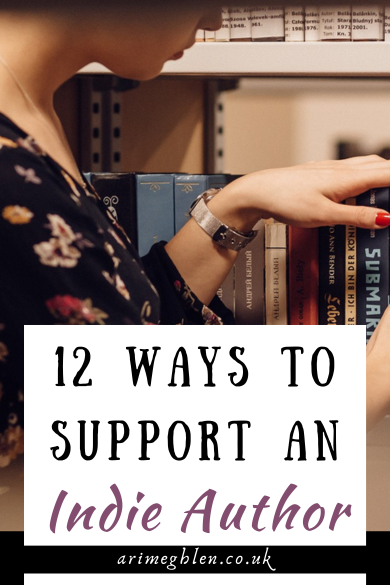Most of my posts are aimed at writers and what they can do to help improve their writing and their marketing.
However, today I want to talk about supporting other authors. After all, we can’t expect people to support and encourage us if we don’t do the same.
Some of these may be obvious, but you’ll be surprised how many writers and author’s I’ve spoken to who don’t do any of these!
Buy Their Books
This is a pretty obvious one, a writer’s product is their book so giving them cash in order to own that product is always the best way to support an Indie author (or any author).
By purchasing the book, you are showing your support for their work. While most authors won’t make a living from their writing, it means a lot to them that people are willing to spend hard-earned cash on something they created.
Yes, authors often share their books for free (and I discussed that here) however, don’t just aim for collecting only free books. Especially when so many books are cheap these days.
Read Their Books
Buying them is great, but try to actually read them. I have a stack of books from indie authors I am currently working through.
It’s hard going as many only came out in ebook and I often struggle to read on a screen for long periods of time.

But I want to support these authors and I want them to know their work is read. It’s often why writers give books away for free, they WANT their story heard. So, do that for them.
Yes we all have an enormous TBR pile, but take some time to choose a new book every month or few months and read an Indie Author’s Book.
Write a Clear Honest Review
Not every writer is a fan of “honest reviews” which is why sock-puppet accounts became a thing and why Amazon got rid of its Anonymous option for reviews.
But the truth is, an honest review is important. Good writers will appreciate your honesty, bad writers might not. *shrug* That’s their issue.

Honest reviews should be clear and concise. If you don’t like something state why you don’t like it.
A quick point, if you hate romance but you picked up and read a romance novel, please don’t leave a bad review ragging on it because of the romance (yes this happens).
If it’s a personal preference, then let people know. If you love something, state why you love it. Just saying “Boring book” or “great book” tells the other readers nothing.
However, always remember to be kind. There is never a reason to be mean, cruel, and/or petty in a review. If you don’t like something, that’s fine – but keep it about the book (not the author, personally) and avoid being cruel. The author is a human being with feelings.
Added: Don’t tag authors into reviews 3-stars or below. This can be very stressful and upsetting. If they want to read their reviews, that’s up to them. Tagging them in to a bad review isn’t nice and it’s considered “bad form”.
Also, don’t SEND them the review to their email or DM. Reviews are for your blog and for review platforms – not to be sent to the author directly. Don’t be that guy!
While they can be useful, because any review helps – I personally suggest writing a little more than that.
Reviews are important, because not only does it give people confidence to buy the book if others have read and reviewed it, but also it affects where the book ranks on places like Amazon. So yes, reviews really ARE important.
Recommend The Book To Others
If you enjoyed the book and you have friends, family or colleagues that have interest in the same books as you, recommend these books when you can.
However, if your friends and family are NOT into the same thing, then don’t recommend it. Don’t have them wasting their time on a book that they probably won’t enjoy – or worse, writing a negative review on a book they weren’t going to like.
You can tell them about the book and see if they’d be interested, but be honest about the details and genre of the book
Just like writers need to know their audience and reach out to them, those who recommend the books should do so stating clearly what the book is about, the genre and who would like it.
Get Them In Your Library
There are three ways to do this, you can request them at the library and they might add it to their stock or you could let the author know and they (MIGHT) supply a copy or two for free to the library directly. Alternatively, you could buy two copies and supply the second to your library.
Many authors are happy to donate copies to libraries. They will usually do this to their local library but if you feel your library would benefit, you can always ask them.
Obviously, is the author is inundated with such requests they might not do it for everyone, but it’s always a possibility.
Use Your Social Media
Everything from BookTube to Bookstagram, people love to share books on social media. So use this to help promote and support your favourite authors.
Photos of you reading the book, posing with the book or just have a picture of a stack of your fave Indie books all help.

Many of us are visual creatures and photos have a stronger effect on us than just words (says the writer! lol).
You can always Tag in the author or add their name and the book title to your hashtags allowing others who are following them to find you.
You can also use social media to connect with other fans of the author.
Reach Out To The Author
Write a fan letter or email. Be genuine, tell them why you loved their book. Writers love hearing from their fans. However…
DON’T ask for free stuff.
DON’T tell them how beautiful/attractive/fit/hot they are (seriously, this can come off as creepy, for any gender)
DON’T expect them to reply. Not every author has the time to reply to emails, some just aren’t good at it, others can take a while. You aren’t owed a reply.

The point of the reach out is to say something positive, and show your support and encouragement to the author.
If you are just expecting some reciprocity for doing that, then don’t bother.
Connect With Them On Their Platforms
Whether it’s their official author website, blog or their social media, reach out to them. Follow their blog or Twitter or Instagram. Subscribe to their YouTube or Newsletter.
Show that you value their content. Many authors ask questions of their readers for feedback and to help them develop their platform. So, help them when they do a survey or ask a question.
If You’re a Blogger
If you’re a blogger, consider reaching out to them and offering them a space on your blog to do a guest post or an author interview or a book review?
Exposure is so important for Indie Authors, especially at the very beginning. They have to find places and people who will support them to get their name out there.
Giving them the option of being featured on your blog is great exposure for them as well as for your blog.
Join Their Street Team
When an Indie author is about to launch a book, they often create a Street Team of people who help them promote their work.
This team is for fans and enthusiasts of the book who get the word out.
If you like an Indie Author, consider joining their street team. Many will have sign ups on their Instagram page or their Website.
Be a Beta Reader
If the Indie Author puts up a request for beta readers, consider putting yourself forward. Beta readers are important for authors, especially Indie authors.
Many people seem to shy away from being a beta reader, worried hey will offend the writer or they will not be very good.
Most authors will give you instructions on what they are looking for. If they don’t, ask what they want you to consider.
Remember, constructive criticism can really help an author as they develop their book. So, if you are given the chance, and have the time, be a beta reader.
Gift Their Book
If you really enjoyed an Indie author’s book, consider buying a copy to give as a gift to someone. Either a friend or family, or maybe even in a giveaway.
This way, you could create a whole new fan for the author. As mentioned earlier, always be clear about what the book is about, the genre, the audience so that only people who would most likely enjoy it will enter.
~ ~ ~
How do you support Indie Authors? Do you have any other ideas to add to this list? Drop them in the comments below.
Happy writing
Want to find me on Insta? Join my Newsletter?
Then visit my LinkTree to find everything
~ ~ ~
Source: Images from Pixabay
© Ari Meghlen. All Rights to the works and publications on this blog are owned and copyrighted by Ari Meghlen or their respective owners in the case of guest posters, podcast hosts etc. The Owner of this site reserves all permissions for access and use of all documents on this site. NO AI TRAINING: Without in any way limiting the author’s [and publisher’s] exclusive rights under copyright, any use of this publication to “train” generative artificial intelligence (AI) technologies to generate text is expressly prohibited. The author reserves all rights to license uses of this work for generative AI training and the development of machine learning language models.




I appreciate you posting this, Ari. Most people are willing to support indie authors if they know how.
Thanks, glad you liked it. After I asked some questions and realised just how few readers did things like leave reviews etc, I thought this post would help to remind people how to help Indie authors and why you should 🙂 I’m happy to say it was a popular blog post 🙂
Excellent tips! Some of these I’ve done in the past and others I hadn’t even thought of. Thanks for sharing them.
Great post, Ari, with great advice on a subject close to my heart. I’m an Indie Author with a growing pile of TBR’s by fellow Indie Authors, and I do write reviews, knowing how important that is. I’m hope for reciprocation having just done a ‘freebie’ for my recently-published novel. 😉
Thanks for reading, Chris. Glad you enjoyed it. I’m so pleased to hear you write reviews, I am always so surprised to hear from fellow writers who never review. We must put out into the world what we would want back. 😀
These are all great tips. The only one I have not done yet is to be a Beta reader.
Thanks for reading, glad you liked it. Do you think you will beta read sometime? Or is it something you’re not interested in?
I might do but finding quality time is the issue.
Reblogged this on Frank Prem Poetry and commented:
Are has written a great article on how to help indie authors.
Thanks for reblogging, Frank
My pleasure, Ari.
Shared on facebook.
Great article, thank you for it.
Thanks so much for the Facebook share 🙂
🙂
This is great and a good ways of supporting indie authors. I havent read many but some I’ve read are fantastic authors, and have had me reading till 1am unable to put my kindle down..
Thanks for reading, glad you liked it. That is awesome that you’ve found some great Indie Writers. Always fun to find a good book that you just can’t put down!
Oh yes defintely.
Brilliant advice, Ari…
Thanks for reading 🙂
Great tips and reminders! Sharing… Thank you.
Thanks for reading, Bette, and for sharing 🙂
My pleasure, Ari! 🙂
Cool advice! I hadn’t thought of the library bit before – but I rarely re-read books ever, so maybe I should consider donating my copies.
Donating your copies is a good idea. lol If I love a book, I will re-read it over and over. For me, that’s the mark of a great book, if I need to keep revisiting that world 🙂 I love how readers are all so different. 🙂
I just go with the ‘buy the book’ way, most of the books I read are either self-published or small press. I also try to write a review (and putting more effort to it the less known it is). As someone who’s in the ‘searching for betas’ stage myself, I thought about becoming one but I don’t know whether my attention to detail is good enough – if the story is good, I’ll become lost in it to the point I might completely ignore some smaller issues. Maybe I’ll grow into it yet, who knows…
Now, I don’t know how good step this is in general but I’ve contacted the author of a story I really loved and asked him whether I could use the name of his character as a kind of ‘easter egg’ – and was pleasantly surprised to have a positive answer.
Different writers want different requirements from their Beta readers. If it’s just an overview, I find sitting with a pad and making notes as they come to you is good. Usually, people who want much more scrupulous attention to detail are looking for Critique Partners rather than Betas.
For those who don’t need you to check out more detail – but let them know where there are weak spots, then often by the time you get to the end of the story, as a beta, you can be able to tell the writer what you liked or didn’t like about the characters, the plot, dialogue that felt stilted etc.